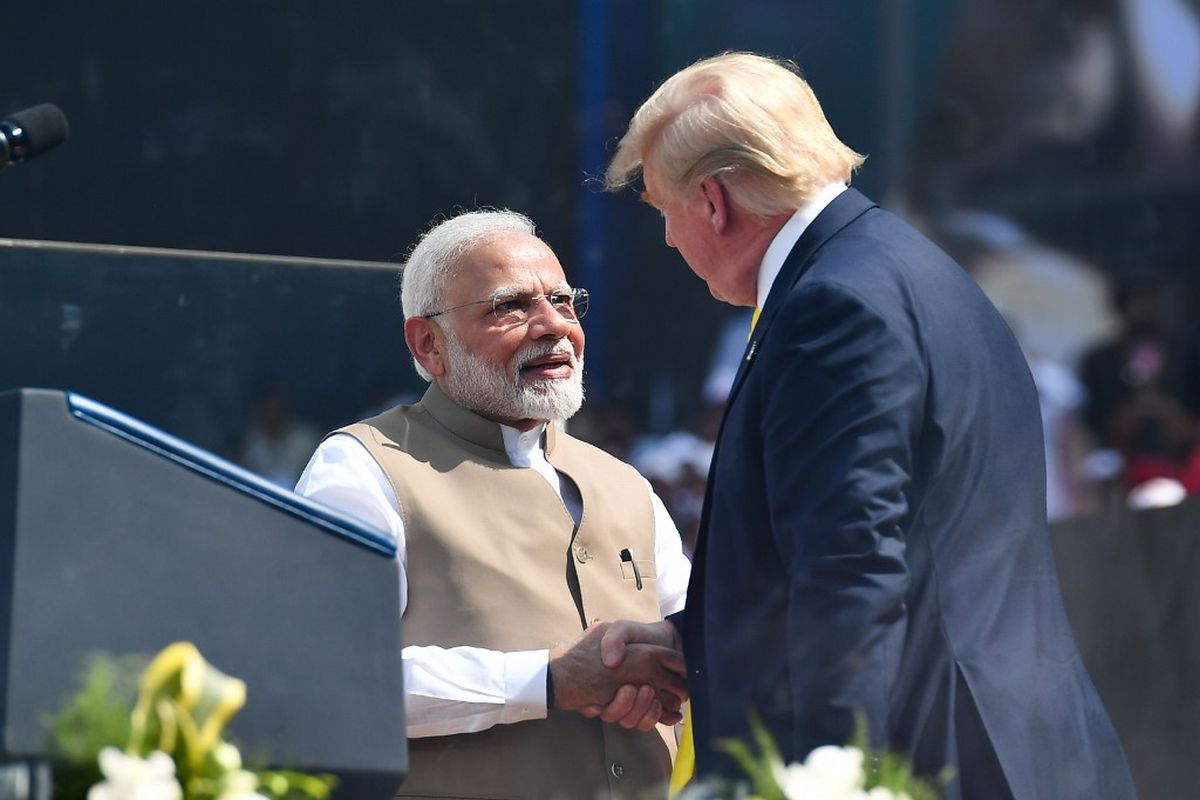Intel appoints Santhosh Viswanathan as India region head
Chip maker Intel on Friday said that it appointed Santhosh Viswanathan to head the India region business as its Managing Director (MD).
During the visit Mr. Trump envisioned a regional leadership role for India not confined to South Asia but extending beyond.

US President Donald Trump (R) shakes hands with India's Prime Minister Narendra Modi during 'Namaste Trump' rally at Sardar Patel Stadium in Motera. (Photo by Mandel NGAN / AFP)
It is not the intention in this paper to repeat the take-away from the recent visit of the US President, Mr. Donald Trump. These have been covered extensively in the electronic and print media. What is being discussed below are some of the more important aspects that require deeper analysis. The first of these relates to the changing definition of strategic autonomy. For several years defence analysts had been talking of India’s unique position of strategic autonomy among the three big powers, namely, the US, China and Russia.
During the visit Mr. Trump envisioned a regional leadership role for India not confined to South Asia but extending beyond. After the defence deals that were signed and the promised technology transfer as well as component manufacture in India the US President spoke of India being a ‘comprehensive global strategic partner’. While India for all intents and purposes is seen to be allied strongly to the US the reverse proposition is equally true. India had started siding with the US long before once it realised that accommodation with China on terms acceptable to India did not seem likely.
On their side the Chinese whose attitude towards India was becoming increasingly belligerent remained distrustful of India, the one-to-one meetings between the two leaders in Wuhan and Chennai notwithstanding. The die is now cast, there is no more hedging with China. They can read the writing on the wall. Where does India go from here? Having unmistakably cast its lot with the US it should shed all inhibitions and get on with it. The leadership should whole-heartedly embrace the quad. No further procrastination. It should take the leadership role and get moving. Meetings with quad leaders should be held yearly and among the militaries and foreign ministers halfyearly.
Advertisement
Triggers that will be required for measured response against specific actions by China should be decided upon and made known to all concerned in East Asia and ASEAN. Quad and all other alignments in the region are purely defensive measures. To go further these are measures to “restrain” and not to contain China as such. To return to strategic autonomy India retains it in full measure outside the region with regard to Russia and the rest of the world. It has fiercely defended its autonomy in dealing with Russia for defence purchases and all other matters of mutual interest.
It is hardly likely to change. Russia realises India’s need to protect its interests in South Asia and to the East; it not being a player in the region nor having geographical contiguity with it. When the Indian Prime Minister meets the Russian President in the months ahead it is reasonably certain that ties between the two countries will be further strengthened. Raising the question of Pakistan at bilateral meetings and insistence to condemn it is becoming counter-productive. It has not led to any change in behaviour.
The FATF is the appropriate forum to take it up. Making it the most important concern for joint statements – often at the reluctance of the visiting heads – merely leads to yawns in the neighbours and weariness around the world. India is now too big and strong to go pleading with all comers to condemn Pakistan. The other aspect related to the Trump visit is the charge levelled at the Prime Minister by several opposition leaders that Mr. Modi has compromised India by putting ‘all eggs in the Trump basket’. On the face of it the concern is well-founded seeing that Trump may or may not be elected for a second term.
In which case whoever comes to power could hold it against the Prime Minister and India for rank partisanship. However, the opposition should know by now that when required Mr. Modi is not averse to taking well-considered calculated risks in the interest of the country as he sees it. He is not unaware of the adverse consequences for him and the country should the risk go wrong. Balakot is a case in point. Had things gone wrong Mr. Modi might not have been re-elected, at least not with an overwhelming majority.
To summarise, the geostrategic situation in the Indo-Pacific and Asia- Pacific is such that no matter who wins the November 2020 election in the US the American defence community realises that the importance of India in the region is more to the interest of the former – even an ineluctable strategic necessity – than the latter. Similarly, from now to November even were the trade agreement not to materialise, enough is likely to be achieved to enhance cooperation substantially in several domains.
(The writer, a retired Major-General of the Indian Army, is a strategic affairs analyst)
Advertisement